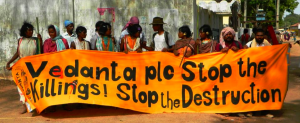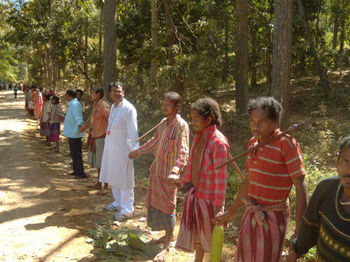Often times in efforts to advance economic gains, governments purposefully turn a blind eye to the needs of people. This issue is exacerbated when the people in question are those who are already on the fringes of society: they have no power, and no voice against the government, even when it's their rights that are being violated. This was the case with the Dongria Kondh. There is a violence in the governments apathy and indifference.
There was a dichotomy in the attitudes of the State and National government with regard to the mining project of Vedanta. The government of Odisha saw lucrative benefits in the revenues that would be generated by the mine. The National government recognized- to an extent- the maltreatment that would ensue for the Tribal community of the area. However, the Ministry in Delhi still allowed Vedanta access, although they shouldn't have. However, Minister Jai Ram Ramesh sympathized with the Dongria as did leader of the National Congress Party of India, Mr. Rahul Gandhi. Mr. Gandhi even went to Niyamgiri to show his support. However, since the Dongria's fight involved actors who belonged to international NGO's, any support won by them had to be shown in utter descretion. It would be a political faux-pas for any of the national players to show they were being "influenced" by international NGO's.

The courts posed another conflicting issue. While the Ethical Committee had passed that Vedanta should not be given permission to start its activities, the Supreme Court overruled its recommendation. This was the first time that the Supreme Court had overrules its own committee.
Today, Survival International is prohibited from having any members from UK being given a Visa to enter India. This is because the current party in power, the Bharatiya Janata Party (BJP) indicted Survival International, Green Peace and Amnesty International with causing a negative impact on India's GDP- citing the Niyamgiri case.

The Dongria's resistance became an internationally relevant story. People in the UK protested heavily against the actions of Vedanta. This was especially because Vedanta was a British mining company. British people rightfully advocated that Vedanta had rules and regulations that it had to respect and could not simply continue to violate the rights of the tribals without any repercussions. The Dongria's action was backed by enormous media support in India and Internationally.
Concurrently, the Dongria held marches regularly, they formed road blocks by making human chains, and were vociferous against Vedanta. Survival International drew attention to their tactics and showed the Dongria's determination the world. The reason why the campaign was a success was because the Dongria just were not going to be bullied by Vedanta, and have their mountain to be taken away from them, especially without a fight. The pride they have in themselves and land couldn't be taken away, and cannot be taken away.
The Dongria resistance was successful in halting the mining activity on their land. However, they are still plagued by the police and other officials who continue to harass them. Recently, their leaders were put into prison under false charges. The Dongira feel the government is trying to erode their community, to take away their land. They continue to put up a strong and united front against any arising obstacles.

